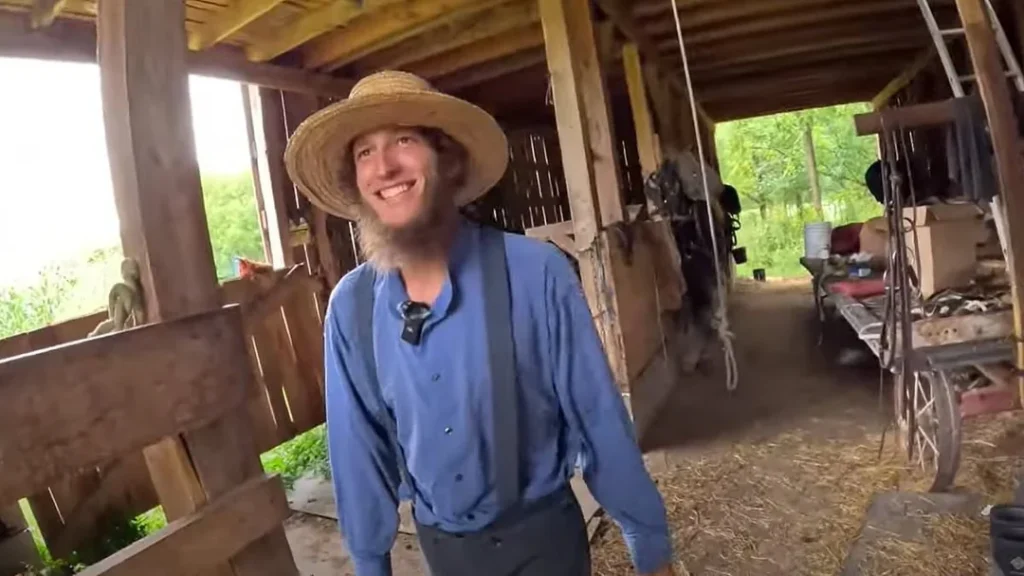Premise: In this post, I want to encourage everyone to stay grounded and be critical and analytical about what you watch on the Internet. This place is not reality, but a part of it.
In recent times, Titus Morris has captured the attention of many through a series of videos published on Peter Santenella channel, which paints his life as a perfect example of “rustic bliss”.
While it’s easy to be captivated by such idyllic portrayals, it’s important to critically assess what we see and understand the broader context.
My goal is to offer a more nuanced perspective and encourage viewers to think critically about the content they consume on YouTube.
Overview of Santenella's First Video About Titus Morris
Peter Santenella’s first video presents Titus Morris’s life as an idyllic retreat into the woods, portraying it as a model of perfection and contentment. The video suggests that Titus Morris has achieved a utopian existence away from modern society, inspiring many to consider abandoning their own lives to follow his example.
My First Impression Watching His First Video (and my pubblic comment)
Here’s the raw comment I wrote on September 18, 2024, on Peter’s channel, below the first Titus video.
Hi, I’ve been thinking a lot before posting this comment because I don’t want you get me wrong. I really appreciate the genuine life this guy shows us, but there are a few things that don’t add up, and I’d like to bring them to your attention.
1. This guy says his name is Titus Morris, but he doesn’t have any documents, so the name could just be an invention. But okay, I’m probably being a malicious person, so forget about it. After all it’s not so relevant.
2. He bought his land with his parent’s money, and there is nothing wrong with that, but please viewers, keep that in mind and acknowledge that most of the time, much more is needed that just “willingness” to live this way, because there are people who will simply never have this opportunity.
And before you start thinking that I’m envious, let me clarify: I’m living my very best life in a small Tuscan town, so I’m not speaking for myself, but on behalf of those who right now are thinking that they should leave their jobs and go to live in the woods “inspire” by Titus’s example, or even worse, go to live with him!
God save them!
3. His parents live nearby, if I heard correctly in the second video. So, he is not completely alone. If something happens to him, if he is ill or not feeling well…
Please, stop romanticizing his life as if he lives “alone in the woods like a hermit” following Christian values, because that’s not the reality.
4. Peter is a professional, and I understand you consider him the “guy next door,” but the people he brings to the channel are not random, and probably in many cases (not all, but many), you need to pay to appear on it.
For example, if you want to promote your work or even a new movement or recruit people for a religious project (if you get what I mean…)
5. It’s very strange that Titus’ friends opened a YouTube channel “on his behalf” due to “the huge success of the first video”.
I believe that everything has been carefully planned. And again, there is nothing wrong with wanting to spread the Gospel, but tell people the complete version of the facts, not just a piece.
6. It’s also very strange that he told Peter there was no problem with publishing his address and phone number, expressing his willingness to be contacted (I wonder why?).
It is obvious he already had a team by the time Peter interviewed him. Again: there is nothing wrong with wanting to create a sacred Christian space; quite the opposite—it’s a nice idea. But please don’t tell us that these three interviews were “spontaneous” because they weren’t.
7. The second video reveals a little bit more and the true intentions come out because he started talking about a kind of temple or church, and Peter invited people to donate. Interesting, isn’t it?
Come on guys, don’t tell me you believe this is spontaneous. Everything was planned. Titus and those who are behind him wanted to create a new movement that’s similar to Amish but without responsibilities.
Just what Western people want: they want Christian life without responsibilities. Titus is perfect for this because he responds to the human need to find God and Christ and live in peace following the Gospel teachings, but without compromise, because they “want to be free”.
Titus’ character is a kind of “new Jay Shetty” but in a Christian version.
So PLEASE, if you are thinking about leaving everything to join him, consider not doing that and at least wait a little.
If you are unhappy with your life, ask God’s guidance, not once, not twice, but one hundred times before moving your first step.
Ask yourself how you want to live, how God wants you to live, and what His plan for you is.
Don’t let your feelings (especially anger, sadness and pain) guide your decisions. Remember this is just a YouTube video, created for entertaining people.
That said, I wish Titus the best.

Critical Analysis Part I
Titus’ Morris Identity and Authenticity
One of the first questions to consider is the authenticity of Titus Morris himself. He claims his name is Titus Morris, yet there is a lack of documentation to substantiate this identity (he said that his birth certificate was lost in a flood).
This raises concerns about whether the persona presented is entirely genuine or perhaps a carefully crafted invention. While it might seem like nitpicking, understanding who we’re really seeing is crucial for assessing the credibility of the message.
Titus Morris Financial Background
Titus’s land was purchased with money from his parents. While there is nothing inherently wrong with this, it’s essential for viewers to recognize that such financial support is not universally accessible. Many people watching the video may not have the same opportunities or resources, which can create an unrealistic benchmark for happiness and success.
Romanticization of Solitude
The video romanticizes Titus’s solitary life in the woods, portraying him as a modern-day hermit living according to Christian values. However, this depiction overlooks the fact that Titus’s parents live nearby. This suggests that his solitude may not be as complete as it appears, and the romanticized view of his life might obscure these realities.

Commercial and Promotional Aspects
Peter Santenella’s channel often features individuals and projects that are not random. It’s possible that appearances on his channel involve financial arrangements or promotions, even for those involved in religious or spiritual movements. This commercial aspect can influence how the content is presented and perceived, raising questions about the underlying motives behind such portrayals.
Spontaneity vs. Planning
The seeming spontaneity of the interviews with Titus might be more carefully planned than it appears.
Emerging Themes and Motives
In the second video, Titus Morris talks about establishing a temple or church and invites donations, which raises further questions about his motives. The introduction of such themes could indicate a larger agenda or movement behind Titus’s persona.

Critical Analysis Part II
The Psychological Appeal of a Simplified Christian Life
At the heart of the Titus Morris phenomenon there is a deep psychological need that many people share: the desire to find meaning, purpose, and connection to something greater than themselves—often God.
For centuries, individuals and communities, like the Amish, have sought to live according to God’s Word through a life of simplicity, commitment, and responsibility.
The Amish, for example, embrace a lifestyle built around faith, community, and strict adherence to biblical teachings, which requires personal sacrifice and accountability.
However, in modern times, we observe a shift in how people approach spirituality. Titus Morris’s portrayal taps into a growing cultural trend where many seek the peace and fulfillment associated with a Christian lifestyle, but without the commitment and responsibilities that come with traditional religious life. This is particularly appealing in a fast-paced, responsibility-laden world where individuals often feel burdened by the pressures of modern society.
A Christian Life Without Responsibility?
The appeal of living in the woods, detached from societal expectations, aligns with this yearning for a simpler, spiritually grounded life. Yet, there’s a subtle contradiction here: true Christian life, as exemplified by communities like the Amish, requires a commitment to both God and the community—a structure that involves responsibilities, duties, and moral obligations.
This includes serving others, abiding by religious rules, and often giving up certain freedoms in the name of faith.
Titus’s lifestyle, as portrayed in the videos, seems to offer the opposite: a life that is spiritually fulfilling but free of the obligations that typically define a Christian existence. This version of faith appears to promise freedom from modern constraints, while simultaneously allowing one to “be free” in a way that more traditional Christian lifestyles would view as incompatible with true devotion.
It’s a vision of spirituality that appeals to those who want the peace of faith without the sacrifice—a version of Christian living that is, in essence, commitment-free.
The Psychological Attraction to Freedom and Faith
Psychologically, this is a potent combination. Many individuals today seek purpose but resist the burdens that come with traditional structures of responsibility, be it religious or societal. Titus Morris represents an ideal for those who wish to “live according to God’s word” but on their own terms. It’s a version of spirituality where personal freedom is paramount, but this very concept contradicts the heart of many Christian teachings, which emphasize obedience to God and communal responsibility.
The Dangers of This Contradiction: Cult-Like Vulnerabilities
For viewers inspired by Titus Morris’ lifestyle, there is a deeper, more concerning danger beyond the appeal of a commitment-free Christian life—the potential to be drawn into a cult-like environment.
When spirituality is offered as a path to freedom without responsibility, it creates a psychological vulnerability. People seeking meaning and direction may become susceptible to manipulation, especially when charismatic figures present a life that seems to combine faith with liberation from societal constraints.
Cult dynamics often emerge when individuals are promised a utopian life, free from the burdens of conventional society, with the added allure of spiritual fulfillment. However, such environments can quickly turn exploitative. The desire to follow someone who appears to offer a shortcut to spiritual peace—without the responsibilities that traditional religious communities demand—can lead individuals into dangerous situations where they are isolated from reality, controlled by groupthink, or even coerced into unquestioning loyalty to a single leader or ideology.
Titus Morris‘ portrayal, combined with the growing interest in alternative lifestyles, could potentially lead some individuals to follow blindly, seeking an idealized version of Christian life that does not exist. Without recognizing the inherent contradictions, they might find themselves in a situation that mirrors cult-like patterns—where personal freedom is promised, but conformity and dependency are the true outcomes.
It’s crucial to remember that true spiritual growth and a meaningful relationship with God come not from escapism, but from a deeper engagement with personal responsibility, community, and ethical living. Those who are disillusioned by modern life must be cautious of seemingly idyllic spiritual paths that offer freedom without accountability.

